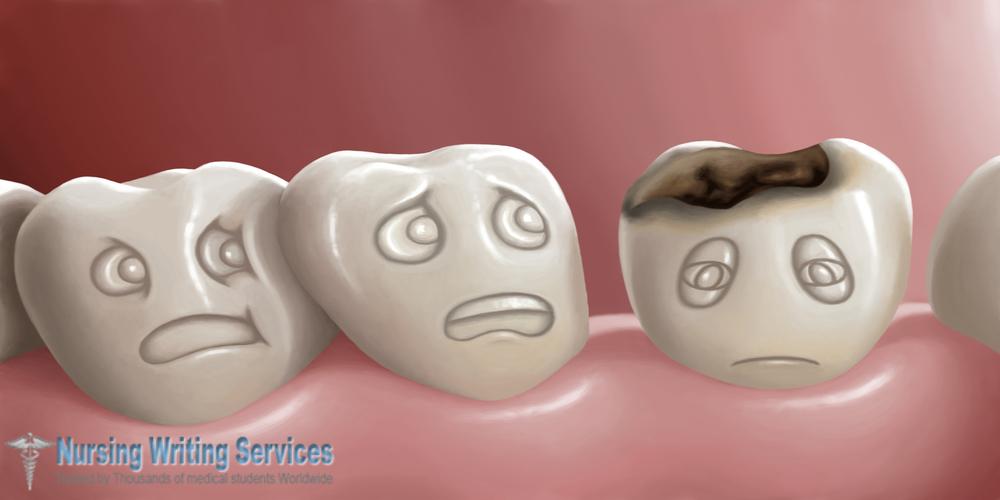
What Causes Tooth Decay
Tooth decay is a destruction of the enamel (outer surface) of a tooth. The decay occurs due to the action of bacteria that hides in the plaque. Plaque is the sticky and whitish film made up of sugary substances in mouth and mucin, a protein in saliva. The bacterial infection destroys hard tissues by producing acid that wears out the teeth. Tooth decay also called tooth cavity or dental caries, and its complications are the leading cause of tooth loss.
If tooth decay is untreated, it might cause infection, extreme pain and even loss of a tooth. It is essential to arrange for regular dental checkups because tooth decay process starts by causing unnoticeable damage to the tooth’s enamel and gradually progresses to the deeper layers and the pulp containing highly sensitive nerves and blood vessels.
Causes of Tooth Decay
You can prevent tooth decay if you know the causes. The factors cause tooth decay.
Poor oral hygiene
The mouth and teeth should be clean to stay in a healthy state. Poor oral health occurs when you do not:
- Brush the teeth regularly
- Floss regularly
- Brush the tongue
- Use mouthwash
See Best Nursing Writing Company reviews by our customers and writers. We are among the best rated company in providing nursing services.
It is ideal to brush the teeth after every meal, but since it is not always practical, you should make an effort of brushing twice, in the morning and night. Brushing the teeth should take two full minutes to allow cleaning all the dirt from every part of the mouth. Proper oral hygiene helps in preventing tooth decay.
Deep tooth crevices and enamel problems
Enamel issues and deep fissures in the teeth are more likely to cause tooth decay. The reason is that deep crevices allow bacteria and plaque easy aces to grow. Dentists use dental sealants to seal deep holes and prevent tooth decay. A dental sealant is safe for uninfected teeth.
Tooth grinding
Tooth grinding is a habit by many people who do not even realize that they do it. It occurs when a person is under intense stress or asleep. Tooth grinding causes decay because it strips away the outer layer of the tooth enamel. A bite guard also called night guard helps to prevent tooth grinding when asleep. Solving the cause of immense stress also helps to avoid grinding.
Lack of enough fluid
Fluoride helps in preventing tooth decay by increasing resistance of the teeth to acids that plaque produces. Plaque on the teeth is a sticky deposit in which the bacteria reproduce. Many public supplies add fluoride to water.
Sugary foods
Sugary foods contribute to growth and survival of bacteria in the mouth. Bacteria in the mouth feed on the sugary foods and start coating the teeth with damaging acids. It happens in few seconds and could occur several times in the course of one meal. Dentists recommend brushing the teeth after every meal to remove the acid. Sugary foods are not just those with many sugars such as candy. There are many types of food containing hidden sugars. These are the foods you should be careful about by establishing if the foods you consume have hidden sugars. Drinks with much sugar such as juice can cause much damage to the teeth as soda.
Acidic foods and drinks
Acidic foods or drinks cause tooth decay by damaging the tooth enamel. Soda is acidic and causes damage to the enamel. Some common foods also that people eat daily also contain teeth damaging acid. Bread and fish are some of the surprising sources of acid. Carbonated beverages like soda and fruit juice are stronger acidic agents that cause tooth decay.
Dry mouth
Saliva helps to inhibit the growth of plaque. This will not occur if dry mouth conditions exist. Prescription medications, genetic or medical conditions like diabetes can be a cause of dry mouth. A vigilant dentist should notice a dry mouth, determine the cause and treatment.
Children are at more risk of tooth decay because their teeth do not have strong minerals and acids wear them away quickly. Babies can also get tooth decay if they take sugary milk formula or juice. Sharing forks, spoons or other utensils also increase the risk of tooth decay.

